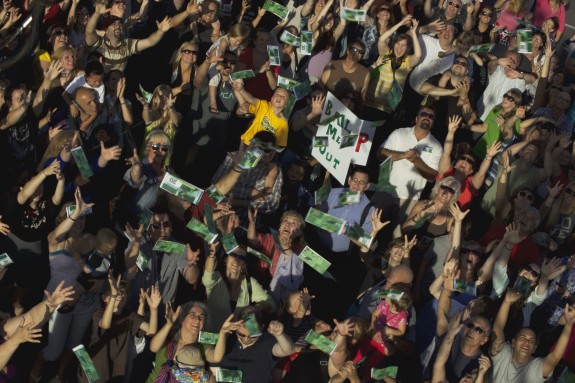MONEY TALKS PART II: Bruce Sellery on Canada’s ‘Million Dollar Neighborhood’

With the economic recession continuing to have nasty repercussions for families across the United States and Canada, reality television programming has set out to document the difficult struggles and inspiring stories of triumph. In the face of sustained economic woes, the cameras have been turned on to bear witness to this unique time in history.
Million Dollar Neighborhood, the new show on OWN: Oprah Winfrey Network, continues that trend and promises to find the balance between entertaining audiences and educating them on their financial options. In Aldergrove, Canada, a small community near Vancouver, families have an up-hill climb to evade bankruptcy and keep their homes. The local residents have many strengths and opportunities, but their willpower needs a shot of adrenaline. Enter Million Dollar Neighborhood and its co-host, Bruce Sellery, financial expert and author of Moolala: Why Smart People Do Dumb Things with Their Money — And What You Can Do About It.
Over the course of 10 weeks, the Aldergrove community comes together for a series of challenges to help regain a financial foundation. Their task is difficult: They need to save an average of $100,000 per week, resulting in $1 million at the end of the series. Sellery is there every step of the way, leading them with new ideas and reminders of their potential.
Recently, Hollywood Soapbox talked with Sellery about the show and what audience members can do to save some money in these difficult times. Here’s Part II of that conversation (click here for Part I). Questions and answers have been slightly edited.
Do some of these families do a complete 180? Are they now more financially stable?
Yeah. The drama of the show comes from watching these family stories unfold, and for them it gets much, much worse before it gets better. It’s analogous to draining the swamp, and clearing the trash, and then let the water refill. That was the reality for some of these families. It did get worse before it got better. The net of it is, I went back for the finale, no camera crew, no producers, just me. And I went back for the finale, and the families that gathered … they’re happy. We made a difference. We really made a difference.
What are you hoping viewers take away from the series?
I would love for viewers to take this on at a small scale in their own communities. Say, ‘Hey, let’s get together the three neighbors that we know kind of sort of well, and do what they are doing on the TV show at a small scale.’ Because if they start doing those challenges, inevitably they’re going to start talking about money a little bit more, and they’ll be able to get some of the support, ideas and accountability that I talk about. I really hope that that’s true.
One of the things that I was trying to do was take away the stigma of talking about money, because I don’t have it. I don’t think we should have it. … There’s a real benefit to talking about it, not just money itself, but what you want to do with it. How do you use it as a tool? We need a cultural change on that front. There’s this whole cliché of keeping up with the Joneses, except the Joneses are $60,000 in credit card debt and they’re up all night trying to figure out how they are going to pay the bills. They are not someone to aspire to be like.
If you were a financial doctor, is stopping credit card use one of the first cures?
You don’t even need to look at the statement for most people. You just need to put the credit card away. If you’ve got an outstanding balance on your credit card, it doesn’t matter what the amount is, but if you haven’t been able to pay it off last month … you need to put it away and stop using.
The simple thing is that reintroduces the pain of spending, and that’s one of the biggest problems that we have, the fact that credit cards have become ubiquitous. Pain is a part of our biology for a reason, because it warns us of danger. So if you think about that in the context of fire, you’re camping and you stick your hand in the fire, if you don’t have those receptors then you’re going to leave your hand in there for 30 seconds and it’s going to be charred to bits. And you’re going to lose your hand. So pain is very, very helpful.
When you have to take cash and you have to peel those bills off to pay for your groceries, that hurts, it’s annoying and it’s inconvenient. But that’s good, that’s very good, because it helps you not overspend. But when you’re just slapping it on a card, why don’t you throw in an extra case of Coke? Why don’t you buy those rib-eye steaks? They look fantastic; they’re on sale. If you go in intending to spend $100, suddenly your grocery bill is $250, because you bought all sorts of stuff. … If I were to prescribe, using your metaphor, one thing it would be for people to take their credit card out of their wallet and go cash only for at least a week.
What’s the future for Million Dollar Neighborhood?
I would love for us to bring the whole challenge to communities in America and in particular communities that really need this kind of support and expertise. So, for example, an inner city neighborhood that has long been suffering … or suburban community that has seen their main manufacturing facility shut down, or a community that’s populated principally by immigrants, who came with nothing and are trying to make their way and follow the American dream. So I think there are so many different stories. We started with one — the suburban community in the shadow of a large city. But there are so many more different stories that would really, I think, speak to a broad swath of the American population.
By John Soltes / Publisher / John@HollywoodSoapbox.com
-
Million Dollar Neighborhood airs Saturdays at 9 p.m. on OWN: Oprah Winfrey Network. Click here for more information.

